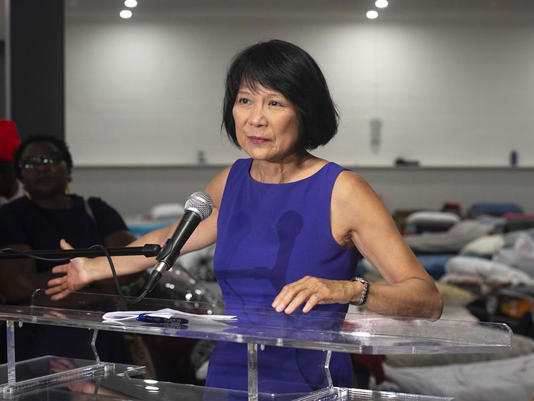
“The City of Toronto is broke,” Mayor Olivia Chow memorably told reporters just two weeks into her term, and roughly as long into her first real crisis: The spectacle of asylum-seekers camped out on a downtown sidewalk awaiting aid from whichever level of government might be willing to provide it. At the time, she was visiting a church congregation that had stepped in to feed and shelter the asylum-seekers. Chow literally turned a pocket inside out to demonstrate Toronto’s financial situation.
Toronto’s budget shortfall is $50 billion over the next 10 years, give or take, in a city with a $16 billion operating budget and that cannot by law run deficits. Any mayor in that situation would be looking for easy budget items to strike through in red pen, and one seems to be presenting itself.
City Council voted in 2021 to rename Dundas Street, and everything named after Dundas Street — transit stations and stops, public spaces, etc. — on grounds its namesake, heavyweight 18th-century Scottish politician Henry Dundas, was offside the abolition debate. The projected cost of this undertaking is $8.6 million, which isn’t even a rounding error against $50 billion. But some suspect senior levels of government might be more amenable to Chow’s bailout requests if the city weren’t conspicuously spending money on obvious non-priorities.
Chow has previously supported the renaming, though that was before she declared the city broke. If she wanted to ditch the idea or punt it into oblivion, she would have support from three former mayors of the city.
In a letter to Chow this week, former mayors David Crombie (Tory), Art Eggleton (Liberal) and John Sewell (independent leftie) claim to have reviewed the historical record and concluded Dundas was, “according to a considerable amount of historic evidence, a committed abolitionist of slavery.” Dundas also appointed abolitionist John Graves Simcoe as Upper Canada’s first lieutenant-governor, they note, and “(took) steps to reverse two decades of oppression of Black Loyalists in the Atlantic provinces.”
In fact, there is no real question that Dundas was an abolitionist. His crime, as found by city staff in 2021 , was “having played an instrumental role in delaying the abolition of the slave trade” (my italics). Whereas others in the movement, notably William Wilberforce, lobbied for immediate prohibition, Dundas and others argued it could lead to unintended negative consequences for the very people they were trying to emancipate. Whether “cynically or as a pragmatist,” staff concluded — and a majority of councillors concurred — Dundas “contributed to the perpetuation of the enslavement of human beings.”
Even that charge is outdated, Tom Devine , professor emeritus at the University of Edinburgh, argued in a letter to City Council last year . “I can assure (you) that the current academic consensus in the U.K. is that … Dundas has been exonerated by scholars in the field as the prime mover on delay,” Devine wrote. “Instead, explanations now focus on a range of military, political and economic factors which rendered delay in abolition inevitable whether Dundas was involved in the process or not.”
I lack the expertise necessary to pass judgment on Dundas’s place in the constellation of abolitionists. But from Toronto’s and Canada’s point of view in 2023, it’s not really the important point. The point is that Toronto’s city councillors have decided that merely being on the right side of a seminal historical issue isn’t enough to save your legacy. You also have to have been on the side of more, faster, harder, damn the torpedoes.
If that notion doesn’t provoke a brief spasm of panicky self-awareness among Canadian politicians who like to think of themselves as being on the “right side,” then perhaps nothing will. Very little gets done quickly in this country, and it often seems like more bad things do than good. Jean Chrétien and Paul Martin will want to be known in future as champions of civil rights for ushering in same-sex marriage. But under the Dundas logic, they could just as easily be accused of dragging their heels: Why did they oppose it until the courts forced their hands? Whether “cynically or as a pragmatist,” Toronto city staff might find in 2223, Chrétien and Martin “contributed to the perpetuation of the inequality of human beings.”
Two hundred years from now, I doubt history will remember Olivia Chow pantomiming poverty in a working-class Caribbean-Canadian church, having failed to open one of many city-owned properties where the asylum-seekers might at least have kept warm and dry. But if history does, I suspect history won’t be very kind about it. “It’s the federal government’s problem” sounds much better on CPAC than it does on the History Channel. So do all the other excuses. But sometimes incrementalism and caution are called for. Sometimes the torpedoes are real. Politicians knew that 200 years ago, just like today’s.
Source: National Post
